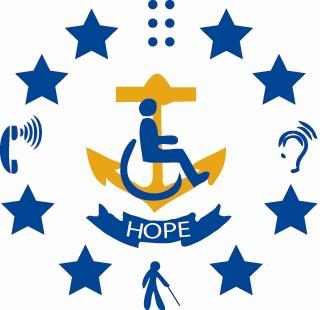 State of Rhode Island
State of Rhode Island
Governor's Commission on Disabilities
John O. Pastore Center, 2 Cherry Dale Court, Cranston, RI 02920-3049
(voice) 401-462-0100 (fax) 462-0106 (tty) via RI Relay 711
(e-mail)
GCD.Disabilities@gcd.ri.gov
(website)
www.disabilities.ri.gov
The ADA and Face Mask Policies
Excerpt from the Disability Issues Brief developed by the Southeast ADA Center and Burton Blatt Institute (BBI) at Syracuse University Updated 8/10/2020
Introduction
Wearing a face mask may be difficult for some people with a disability or health condition. This fact sheet offers guidance about the issue of face mask policies, reasons why a person with a disability might not be able to wear a face mask, and the legal rights a person has under the Americans with Disabilities Act (ADA).
On March 11, 2020, the World Health Organization (WHO) declared COVID-19 as a pandemic. The CDC recommends that people over age two wear a face mask in public where it can be hard to stay six feet apart from others.
On July 31, 2020, Governor Raimondo updated the Executive Order requiring the use of facemasks which includes exceptions for
"…. those persons whose health would be damaged" and "…. those persons who are developmentally unable to comply…". The Executive Order also states
"Nothing in this Executive Order shall require a store or other place of business to refuse entry to a customer not wearing a face mask."
The state policy does not override the consideration of reasonable modifications required by the ADA. If a person with a disability who is covered by the ADA is not able to wear a face mask, state and local government agencies and private businesses must consider
reasonable modifications to a face mask policy. It is important to focus on how to provide goods or services to a customer with a disability in an equal manner.
The requirement to modify a policy, practice, or procedure does not include individuals without disabilities, as they are not protected under the ADA.
Examples when someone with a disability might not be able to wear a mask
• Individuals with asthma, chronic obstructive pulmonary disease (COPD), or other respiratory disabilities may not be able to wear a face mask because of difficulty in or impaired breathing.
• People with post-traumatic stress disorder (PTSD), severe anxiety, or claustrophobia (an abnormal fear of being in enclosed or narrow places), may feel afraid or terrified and may not be able to stay calm or function when wearing a face mask.
• Some people with autism are sensitive to touch and texture. Covering the nose and mouth with fabric can cause sensory overload, feelings of panic, and extreme anxiety.
• A person who has cerebral palsy may have difficulty moving the small muscles in the hands, wrists, or fingers and may not be able to put it on or take it off.
• A person who uses mouth control devices such as a sip and puff to operate a wheelchair or assistive technology or uses their mouth or tongue to use assistive ventilators will be unable to wear a mask.
•A person who is deaf or hard of hearing may need to lip-read to understand instructions and will need to communicate with employees.
Examples of reasonable modifications to a face mask policy
•Allow a person to wear a scarf, loose face covering, or full face shield instead of a face mask;
•Allow customers to order online with curbside pick-up or no contact delivery in a timely manner;
•Allow customers to order by phone with curbside pick-up or no contact delivery in a timely manner;
•Allow a person to wait in a car for an appointment and enter the building when contacted;
•Offer appointments by telephone or video calls.
•Offering other modes of communication for persons who are deaf or hard of hearing.
Best Practice Tip
Prepare a list of possible alternatives to a face mask/cloth face-covering policy that you can share with people with disabilities. Following ADA requirements for reasonable modifications within federal, state, and local health and safety guidelines will allow you to keep employees and customers safe, reduce new infections, and still provide goods and services to everyone.
For more information about rights under the Americans with Disabilities Act (ADA) and how they apply to the coronavirus (COVID-19) pandemic, visit ADA,
Disability & COVID-19 Resources (adacovid19.org).

State of Rhode Island

